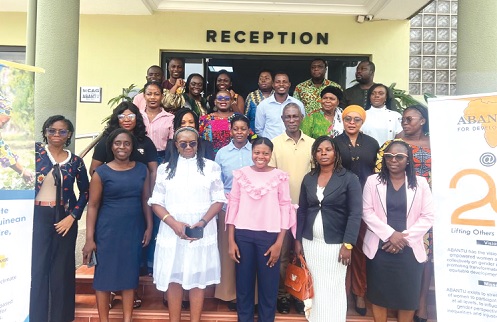Climate change impacts men and women differently, given their roles and responsibilities at the household and community levels.
Women are less able to adapt and are mostly treated as victims, suffering disproportionately from the effects of climate change. Women’s vulnerability is partly attributed to their high representation in informal employment, which is based on natural resources or agriculture, as well as their lower levels of education.
They also experience greater financial and resource constraints and lower access to information.
Women are also affected by the gendered divisions of labour that cause them to spend the majority of their time in unpaid and time-consuming activities.
In Ghana, patriarchal practices in most parts of the country enforce male dominance in society.
Household chores, which are the primary responsibility of women, place limitations on their level of involvement in management and decision making.
Nonetheless, women possess significant local knowledge often relevant for adaptation to and mitigation of climate change.
Stakeholders meeting
At a stakeholders' engagement in Accra on strengthening the Gender Responsiveness of Ghana’s Nationally Determined Contributions (GH-NDCs 3.0), organised by ABANTU for Development with support from the World University Service of Canada (WUSC-EUMC), the Centre for International Studies and Cooperation (CECI) and the International Union for Conservation of Nature (IUCN), participants called for the strengthening of gender responsiveness of the GH-NDC 3.0.
The stakeholder engagement was organised under ABANTUs “Nature-Based Climate Adaptation in the Guinean Forests of West Africa” project, otherwise known as the “NbS Guinean Forests”, which is a three-year project being implemented in the Lake Bosomtwe and the Wassa Amenfi Districts of Ghana, Guinea and Cote d’Ivoire.
The Executive Director, ABANTU, Dr Rose Mensah-Kutin, in her welcome remarks, said the project would help improve women’s leadership in terms of climate adaptation.
She said the Environmental Protection Agency (EPA) had revised the country’s nationally determined contribution and called for, among others, to strengthen women’s needs and concerns to ensure that it was not just an appendix but central to national development.
A Deputy Director, Head of Climate Change, the Ministry of Environment Science and Technology (MEST), Gyimah Mohammed, who made a presentation on the country’s Nationally Determined Contributions (GH-NDCs 3.0) and Areas for Strengthening its Gender Responsiveness, said the country was on track in updating its policies.
He said the NCDs were national policy instruments that communicated countries' domestic climate commitments to the international community, reported progress towards these commitments and outlined support needed to ensure effective implementation.
He said the NDCs embodied efforts by countries to reduce national emissions and adapt to the impacts of climate change, saying these national policy instruments were at the heart of the Paris Agreement and the achievement of its long-term goals.
Climate action
A Negotiator, the United Nations Framework Convention on Climate Change (UNFCCC) and Gender Action on Climate Change for Equality and Sustainability (GACCES) Convenor, Patience Damptey, who spoke on Status of the Gender Mandate of the UNFCCC: Implications for the NDC 3.0 and Conference of the Parties (COP30), said the upcoming NDC 3.0 submissions presented an opportunity for countries to integrate gender equality into their climate commitments.
She said the UNFCCC had recognised the importance of gender equality in climate action, saying that the status of the gender mandate of the UNFCCC highlighted the need for continued efforts to promote gender equality in climate action.
According to her, COP30 presented an opportunity for parties to strengthen their commitments and implement gender-responsive climate policies.
She said at COP30, parties are expected to adopt a new Gender Action Plan that promotes gender equality and addresses the disproportionate impacts of climate change on women and girls.
Writer’s email: rebecca.quaicoe-duho@graphic.com.gh

